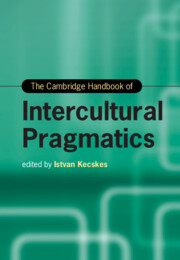Book contents
- The Cambridge Handbook of Intercultural Pragmatics
- Cambridge Handbooks in Language and Linguistics
- The Cambridge Handbook of Intercultural Pragmatics
- Copyright page
- Contents
- Figures
- Tables
- Acknowledgment
- Contributors
- Introduction The Rise of Intercultural Pragmatics
- Part I Theoretical Foundation
- Part II Key Issues in Intercultural Pragmatics Research
- 5 The Cultural, Contextual, and Computational Dimensions of Common Ground
- 6 Role of Context
- 7 (Mis/Non)Understanding in Intercultural Interactions
- 8 Creativity and Idiomaticity in Intercultural Interactions
- 9 Metaphors in Intercultural Communication
- 10 Common Ground in Linguistic Theory and Internet Pragmatics: Forms of Dynamic Multicultural Interaction
- 11 Vague Language from a Pragmatic Perspective
- 12 Humor in Intercultural Interactions
- 13 Emotion in Intercultural Interactions
- 14 Research Methods in Intercultural Pragmatics
- Part III Interface of Intercultural Pragmatics and Related Disciplines
- Part IV Intercultural Pragmatics in Different Types of Communication
- Part V Language Learning
- Index
- References
14 - Research Methods in Intercultural Pragmatics
from Part II - Key Issues in Intercultural Pragmatics Research
Published online by Cambridge University Press: 29 September 2022
- The Cambridge Handbook of Intercultural Pragmatics
- Cambridge Handbooks in Language and Linguistics
- The Cambridge Handbook of Intercultural Pragmatics
- Copyright page
- Contents
- Figures
- Tables
- Acknowledgment
- Contributors
- Introduction The Rise of Intercultural Pragmatics
- Part I Theoretical Foundation
- Part II Key Issues in Intercultural Pragmatics Research
- 5 The Cultural, Contextual, and Computational Dimensions of Common Ground
- 6 Role of Context
- 7 (Mis/Non)Understanding in Intercultural Interactions
- 8 Creativity and Idiomaticity in Intercultural Interactions
- 9 Metaphors in Intercultural Communication
- 10 Common Ground in Linguistic Theory and Internet Pragmatics: Forms of Dynamic Multicultural Interaction
- 11 Vague Language from a Pragmatic Perspective
- 12 Humor in Intercultural Interactions
- 13 Emotion in Intercultural Interactions
- 14 Research Methods in Intercultural Pragmatics
- Part III Interface of Intercultural Pragmatics and Related Disciplines
- Part IV Intercultural Pragmatics in Different Types of Communication
- Part V Language Learning
- Index
- References
Summary
This chapter surveys and discusses research methods and research designs commonly and saliently adhered to within the field of intercultural pragmatics. A particular focus will be on data collection methods and qualitative analytical approaches to empirical data, with the guiding question of this chapter being: What are the most saliently trending research methods employed in current and recent research in intercultural pragmatics?As such, this chapter represents a hub among the contributions assembled in thishandbook in that it intertwines with or at least closes contingent spaces between topics and issues discussed across the five strands covered. Thus, this chapter not only falls back on what has been established concerning the underlying theoretical foundations of the field and its methodologies as a whole, but also sets reference points to key issues in “doing” research in intercultural pragmatics. Sections included offer an extensive review of the massive body of literature on conventional and relevant terminology as well as salient aspects of data collection and data analysis in (intercultural) pragmatics overall. The core sections present research designs ranging from introspective, observational, and extracted data to (non- )experimental data elicitation techniques and tasks.
Keywords
- Type
- Chapter
- Information
- The Cambridge Handbook of Intercultural Pragmatics , pp. 361 - 394Publisher: Cambridge University PressPrint publication year: 2022
References
- 2
- Cited by



